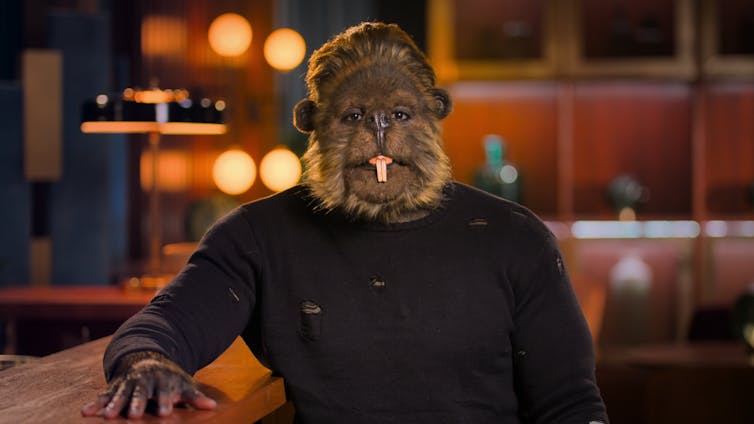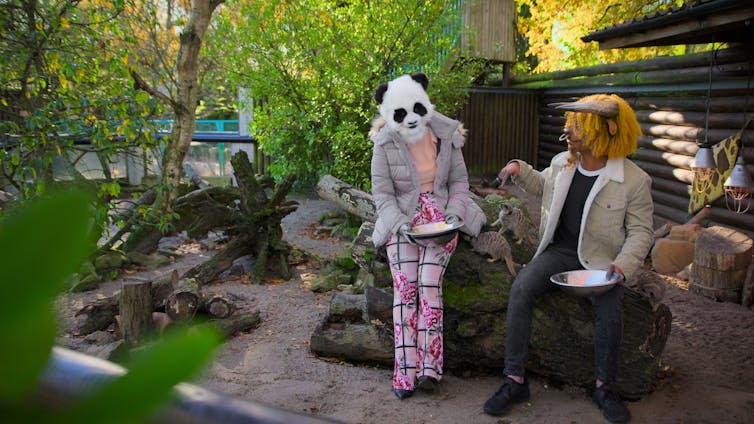Netflix's Sexy Beasts tells us you can take physical attraction out of love. The reality is much more complicated
- Written by Raquel Peel, Lecturer, University of Southern Queensland
Netflix’s Sexy Beasts, out today, promises to move past superficial dating by having contestants meet while wearing heavy make-up and prosthetics to disguise their physical attributes.
First up is Emma, the demon, a six-foot tall model from New York. When asked about her expectations of dating and her ideal partner, Emma explains “it is just all in the chemistry” and “sexual attraction is definitely a must.”
Throughout the series, contestants speak of physical attributes they want to see in a romantic partner: mandrill Bennett hopes to find someone with “big boobs”; beaver James explains it is “ass first, personality second”; and the pixie Amber connects with her date over his big bicep muscles.
Masks aren’t enough to disguise build, height, and complexion — or the fact all of the contestants are conventionally attractive. Although we are shown the pairs connecting in disguise, the lead up to the unmasking proves expectations of meeting someone physically attractive still remains.
In a modern-day Perfect Match, Sexy Beasts asks if people can fall in love “solely” based on personality.
But how do we really fall in love?
The biology of love can be measured …
Signs of physical attraction can be measured in the brain as biological responses to an appealing visual stimuli. Brain imaging has shown a number of areas actively light up when we see someone we consider attractive. These activated areas are consistent regardless of an individual’s gender identity and sexual preference.
 Specific areas of our brains light up when we see someone attractive.
Netflix
Specific areas of our brains light up when we see someone attractive.
Netflix
Physical attractiveness is not just based on facial qualities. We judge physical attractiveness based on waist-to-hip ratio and breast size (for female bodies in particular); waist-to-chest radio (for male bodies in particular); and skin tone.
According to evolutionary psychology, heterosexual males tend to look for a partner who signifies youth and fertility. Heterosexual females tend to look for a partner with a strong immune system and who can provide support for the young.
Read more: Is there really a single ideal body shape for women?
The “neurobiology of love theory” posits love is an emotion that has evolved to encourage beneficial biological behaviours such as sex, reproduction and survival of individuals and their species.
The general thesis here is love is a learned conditioned response.
… but it’s not all biology
This explanation for how we understand love is limited.
Social and developmental researchers specialising in relationships (such as myself) believe individuals will evaluate potential romantic partners based on a trade-off of three different desirable characteristics: physical attractiveness, yes, but also kindness and wealth.
 You can’t just be hot. You must also be kind.
Netflix
You can’t just be hot. You must also be kind.
Netflix
In relationships, “kindness” can also be described as warmth and trustworthiness, having a partner who is understanding and supportive. “Wealth” relates to both status and resource, having a partner who is successful in their profession. Globally, kindness has been rated as the most important criteria, followed by physical attractiveness and then wealth.
It is highly improbable one individual will be able to perfectly meet all these standards. Therefore, expectations are often modified to justify partner selection.
Failing to adjust expectations, some individuals will continually change partners to try and find someone who can fit all of their expectations.
My research has shown “falling short” or “not living up” to partners’ expectations is a recipe for relationship sabotage.
Sexy Beasts tries to take “physical attractiveness” out of the equation, forcing contestants to rely instead on their judgements of “what is important” to establish and maintain a long lasting relationship. But we can’t modify our expectations simply by completely removing one factor from consideration.
How to build a relationship
Watching Sexy Beasts as a relationship expert, I was not convinced contestants in this show connected based on personality alone. The show removes some elements of judging physical attractiveness, but it doesn’t give the space for the individuals to judge kindness and wealth.
Social context is an important factor when deciding which partner characteristics are important. As with all reality dating shows, these contestants are motivated not by love, but by winning a competition — even if that means going against what is important to them in a partner and a relationship.
 True love requires compatibility, but also work.
Netflix
True love requires compatibility, but also work.
Netflix
The owl, Gabi, is a veterinary student from West Virginia who talks about her love for dogs — but she is matched to a potential partner who is allergic to dogs. The dolphin Nina is looking for a “cowboy” — but does not chose the contestant who matches that description.
The panda Kariselle, an outgoing and “nerdy” party motivator from New Jersey, is looking for a husband. But, on the show, she rejects the bull, Josh, who is “dating to marry” and looking for an outgoing partner with the same “nerdy” interests as him.
To promote connection without physical attraction we should look at other qualities. Warmth, expressivity, openness, and a good sense of humour are common factors conducive to long-term relationships. Although individuals might be able to meet and start a relationship disguised as “sexy beasts”, long-term commitment requires a connection based on personal insight and understanding of what we need in a partner.
Hours of work have gone into the creation of each of these “sexy beasts”. But it is nothing compared to the work it takes to make a relationship last.
Authors: Raquel Peel, Lecturer, University of Southern Queensland





